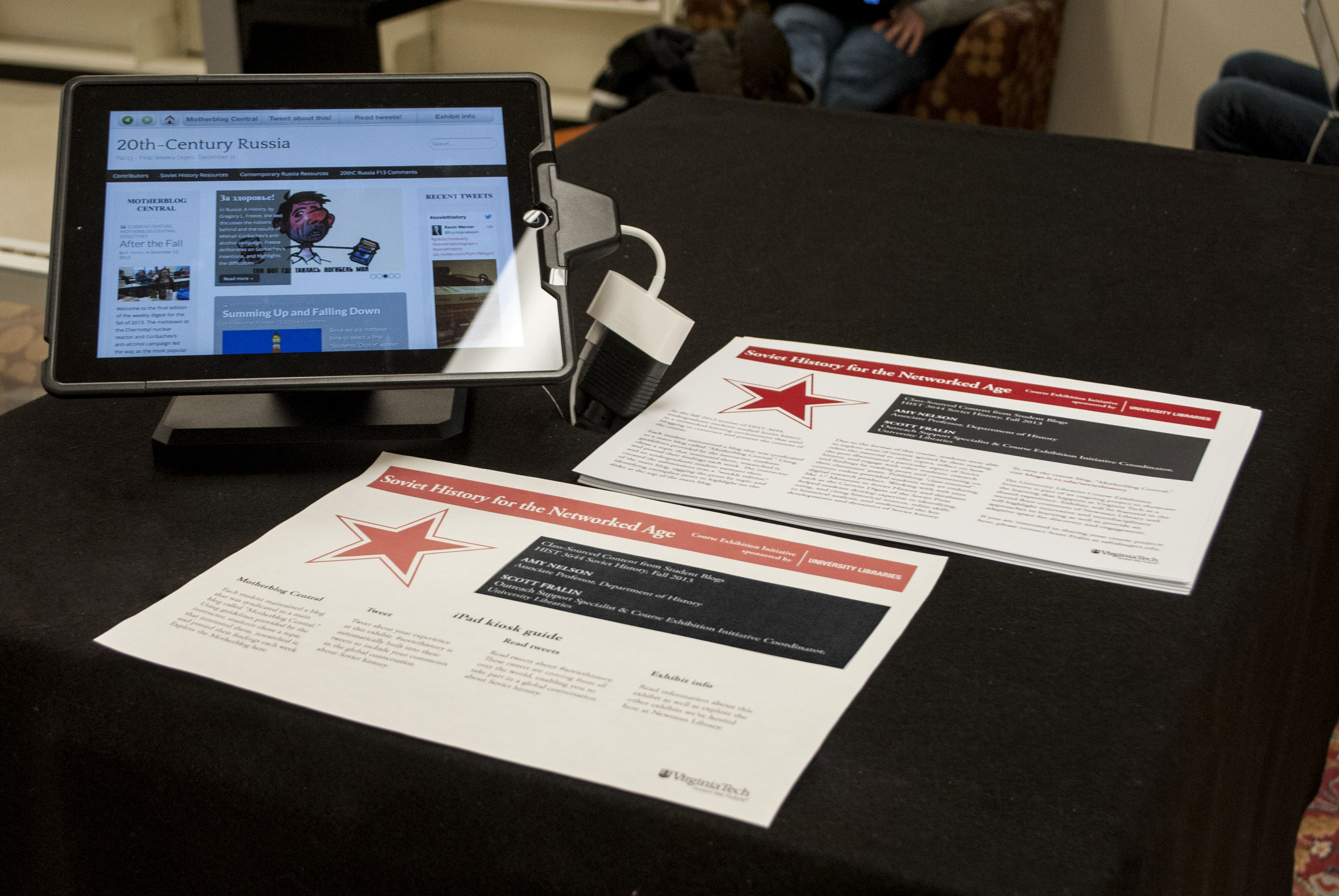Library and technology partnerships bring Soviet History course into the digital age

When Associate Professor of History Amy Nelson incorporated a new blog into her Soviet History class, students quickly embraced the digital-age approach.
Nelson's new approach to a long-standing course is a recent example of how innovative partnerships between University Libraries at Virginia Tech and the university's Technology-enhanced Learning and Online Strategies unit have allowed students to cultivate their own learning experiences.
“This kind of original, digital history work develops the research, writing, communication, and digital literacy skills of students in ways that are deeply exciting to witness and rewarding to facilitate,” said Nelson.
The students' work was curated into an exhibit at Newman Library in which visitors could interact with the blogs through iPads and digital displays.
Though Soviet History (HIST 3644) has been among the most popular courses in the Department of History, Nelson noticed that students’ interest and excitement for the course seemed to taper off after a semester of lectures, discussions, essays, papers, oral reports, and peer reviews.
“I wanted more,” said Nelson. “I wanted to try something new.”
Nelson saw the benefits of creating a “digital history classroom" using course blogs. She also wanted to empower students to create and process different course materials themselves rather than just writing to demonstrate content mastery.
With an Innovation Grant sponsored by Technology-enhanced Learning and Online Strategies and help from the University Libraries, students integrated material from digital newspaper collections such as the Current Digest of the Russian Press into their research and blog posts.
Students also sourced material from Virginia Tech’s Digital History Reader, websites such as Seventeen Moments in Soviet History, and digital photography exhibits from the Library of Congress.
Adding so many different types of media and creating a main motherblog to manage 38 student blogs required a particular interface. With support and funding from the University Libraries, Nelson used a custom WordPress theme to design the motherblog, Twentieth Century Russia.
“We are seeing more and more that scholarly content isn’t enough,” said Brian Mathews, associate dean for Learning and Outreach at the University Libraries. “The way it is packaged and can be repacked within diverse environments is becoming a vital part of the learning experience.”
Nelson and her teaching assistant, Ben Midas of Chesapeake, Va., a senior University Honors student majoring in history, curated students’ individual posts into a weekly edition on the motherblog, featuring the most engaging and impressive research in the top slider or with a “red star” tag.
“While I’ve found blogging to be a rewarding medium for students to respond to and engage with course material, the format I’m using here gives students the chance to engage directly with primary and secondary materials (both print and electronic), conduct their own research, and present their findings in ways that are meaningful and interesting to them,” said Nelson.
By allowing students to focus their own research topics and write about them, much of the content was “class-sourced,” which further enriched the course and facilitated engaging face-to-face discussions during class.
“If one person is interested in technology, he or she may post about the Space Race. If another person is interested in religion, that student can write on Eastern Orthodoxy,” said Leah Williams of Roanoke, Va., a junior majoring in management in the Pamplin College of Business and history in the College of Liberal Arts and Human Sciences. “By the time we’re all done, we have each learned something narrow and specific, but we’ve also collectively learned from everyone else's posts.”
“It becomes less about a numeric grade and more about whether you learned something new related to the course themes,” added Williams.
Dedicated to its motto, Ut Prosim (That I May Serve), Virginia Tech takes a hands-on, engaging approach to education, preparing scholars to be leaders in their fields and communities. As the commonwealth’s most comprehensive university and its leading research institution, Virginia Tech offers 240 undergraduate and graduate degree programs to more than 31,000 students and manages a research portfolio of $513 million. The university fulfills its land-grant mission of transforming knowledge to practice through technological leadership and by fueling economic growth and job creation locally, regionally, and across Virginia.




.png.transform/m-medium/image.png)